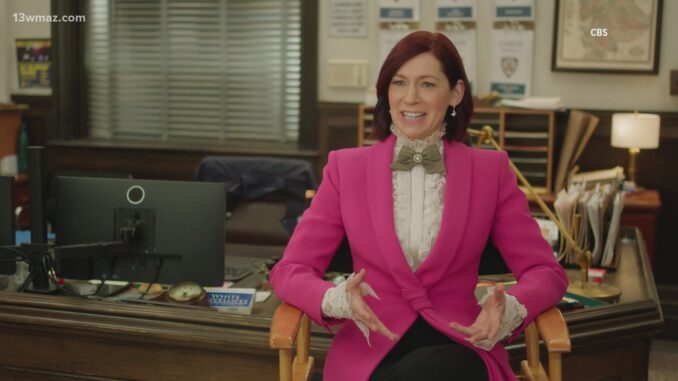
The Cerulean Compass: How Elsbeth CBS Reimagines The Good Wife in a Brighter, Smarter Way
In the sprawling, often morally ambiguous universe crafted by Robert and Michelle King, there exists a particular shade of cerulean that always stood out. It belonged to the perfectly mismatched ensembles of Elsbeth Tascioni, a lawyer whose genius lay not in legal precedent, but in her seemingly scatterbrained observations and an uncanny knack for seeing the world askew. From her earliest appearances in The Good Wife to her more frequent, pivotal roles in The Good Fight, Elsbeth was a delightful, albeit disarming, disrupter. Now, with Elsbeth, CBS has not merely spun off a character; they have orchestrated a brilliant act of creative metamorphosis, reimagining the DNA of their sophisticated legal dramas into something undeniably brighter and demonstrably smarter.
The most immediate, and perhaps most striking, reimagining is the show’s brighter aesthetic and tonal shift. The Good Wife and The Good Fight were steeped in a rich, often cynical, tapestry of Chicago and New York’s political and legal underbellies. Their palettes leaned towards power suits, muted tones, and the occasional burst of courtroom drama. Elsbeth, by contrast, is a chromatic explosion. From the moment Elsbeth steps onto the vibrant, bustling streets of New York City, it’s clear we’re in a different world. Her signature flamboyant outfits, once an eccentric quirk, now mirror the show’s entire disposition. The cinematography is lighter, the city itself a character of lively energy rather than oppressive concrete.
This brightness isn’t just visual; it’s deeply embedded in the show’s spirit. While The Good Wife often grappled with the moral compromises inherent in its characters’ pursuits, Elsbeth embraces a more optimistic, albeit still sharp, view of justice. Elsbeth herself, despite her unconventional methods, possesses an unwavering belief in fairness. Her investigative journey, often a “reverse Columbo” where the audience knows the killer from the start, isn’t about the grim pursuit of a shadowy figure, but the joyful unraveling of a puzzle. The stakes feel less existentially heavy and more akin to a delightful intellectual challenge, inviting the audience to revel in the cleverness of the solution rather than dread the darkness of the crime. The humor, always a subtle thread in the Kings’ work, is now front and center, a playful, effervescent charm that lightens the potentially grim subject matter without trivializing it.
Beyond the radiant surface, Elsbeth is profoundly smarter in its narrative approach and its deconstruction of the procedural genre. The Good Wife excelled at intricate legal arguments and character-driven drama, often requiring viewers to keep pace with complex storylines. Elsbeth maintains this intellectual rigor but pivots it into a more psychological, character-focused mystery. The “howdunnit” structure allows the show to delve deeply into the motivations and meticulous planning of the perpetrators, treating each episode as a carefully curated gallery of human foibles and ingenious misdirection.
The true genius lies in how the show frames Elsbeth’s intelligence. She isn’t a legal scholar or a hardened detective; she’s an unparalleled observer of human behavior. Her “scatterbrained” exterior is a shield, allowing her to disarm suspects and gather information through seemingly innocuous tangents. The show brilliantly illustrates how her seemingly disconnected thoughts, her penchant for noticing the tiny, irrelevant details – a scuff on a shoe, a peculiar turn of phrase, a misplaced prop – ultimately coalesce into a seismic shift in understanding. It’s a masterclass in showcasing a unique form of intelligence, demonstrating that true insight often comes from looking sideways at the obvious.
Behind the Scenes, this reimagining speaks volumes about the Kings’ commitment to character evolution and their daring in pushing genre boundaries. Recognizing Elsbeth’s singular appeal, they’ve taken a character beloved for her ability to cut through the noise of complex legal battles and placed her at the forefront of a different kind of fight. The decision to make her a police liaison rather than a courtroom litigator is a stroke of brilliance. It allows her character to flourish in new ways, liberating her from the strictures of legal procedure and letting her unique brand of eccentric investigation take center stage. CBS, by greenlighting such a distinct tonal departure for a character from a well-established universe, demonstrated a trust in the Kings’ vision and a keen understanding of what makes television compelling: characters that audiences genuinely adore.
Elsbeth is more than just a successful spin-off; it’s a testament to the power of creative reinvention. It takes the sophisticated writing and character depth inherent in The Good Wife‘s legacy and filters it through a lens of vibrant optimism and intellectual playfulness. By giving us a brighter visual world and a smarter approach to storytelling, Elsbeth doesn’t just continue a beloved narrative; it boldly carves out its own distinct, delightfully quirky, and utterly compelling space in the television landscape. It proves that even in the most intricate of legal universes, a splash of cerulean can illuminate the path to justice in a wonderfully unexpected way.
